GSAS Alums Celebrated in 2023 Awards Ceremony
Image Carousel with 6 slides
A carousel is a rotating set of images. Use the previous and next buttons to change the displayed slide
-
Slide 1: Lauren Faber O’Connor (’05MA, Climate and Society) chatting before receiving The Dean’s Award for Distinguished Achievement
-
Slide 2: Dean Carlos Alonso giving opening remarks in the library of Casa Italiana
-
Slide 3: Vice Dean Andrea Solomon with Ana DiGiovanna (’23MPhil, Psychology) recipient of The Presidential Award for Outstanding Teaching by a Graduate Student
-
Slide 4: Mia Nagawiecki (’16MA, American Studies), Vice President for Education at the New York Historical Society, recipient of The Outstanding Recent Alumni Award
-
Slide 5: Colin H. Kahl (’00PhD, Political Science) U.S. Under Secretary for Defense for Policy, recipient of The Dean’s Award for Distinguished Achievement
-
Slide 6: Tyler Campbell (’23MA, African-American Studies) and Della Maggio (’23MA, Human Rights Studies) received The Devon T. Wade Mentorship, Service, and Advocacy Award
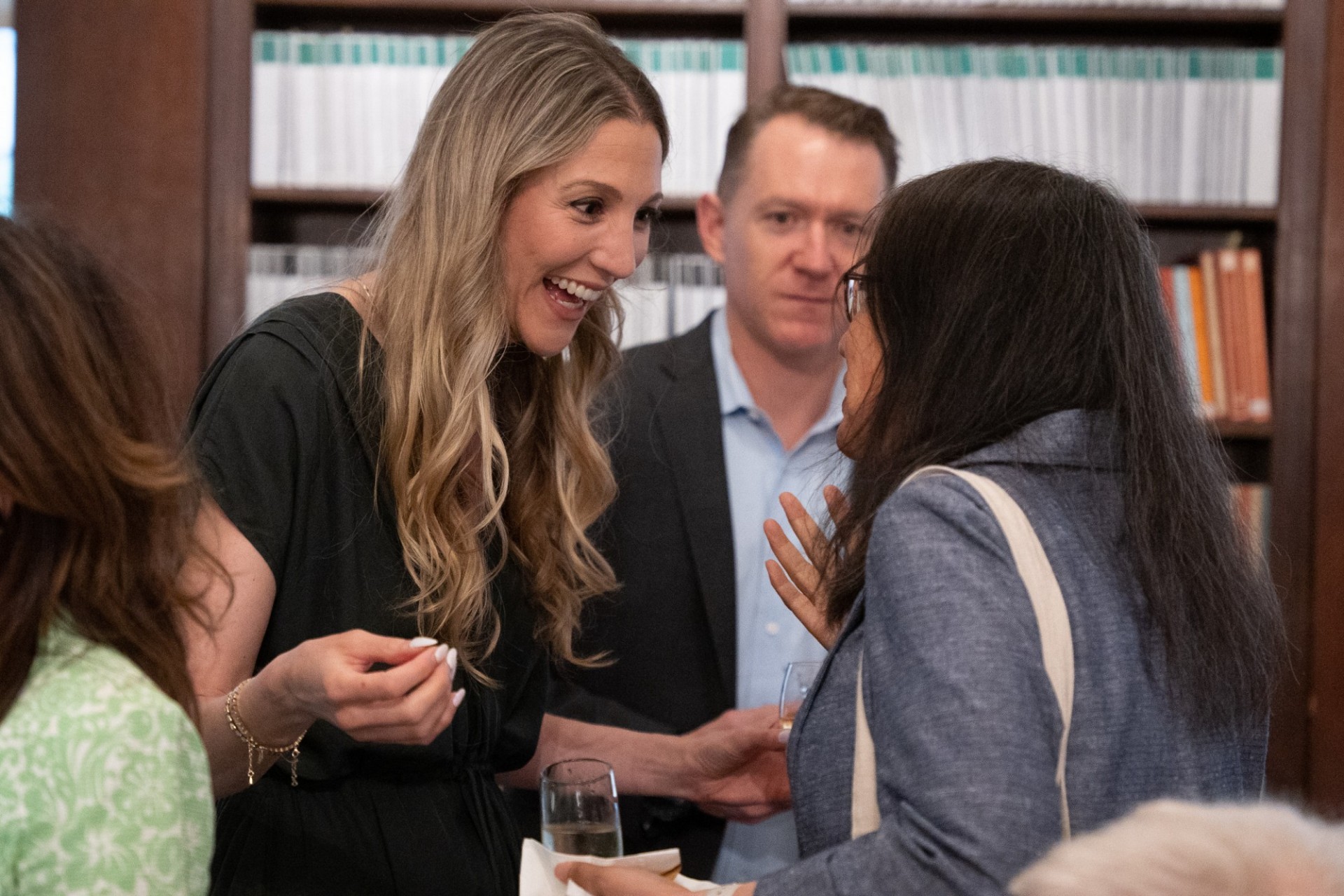
Lauren Faber O’Connor (’05MA, Climate and Society) chatting before receiving The Dean’s Award for Distinguished Achievement
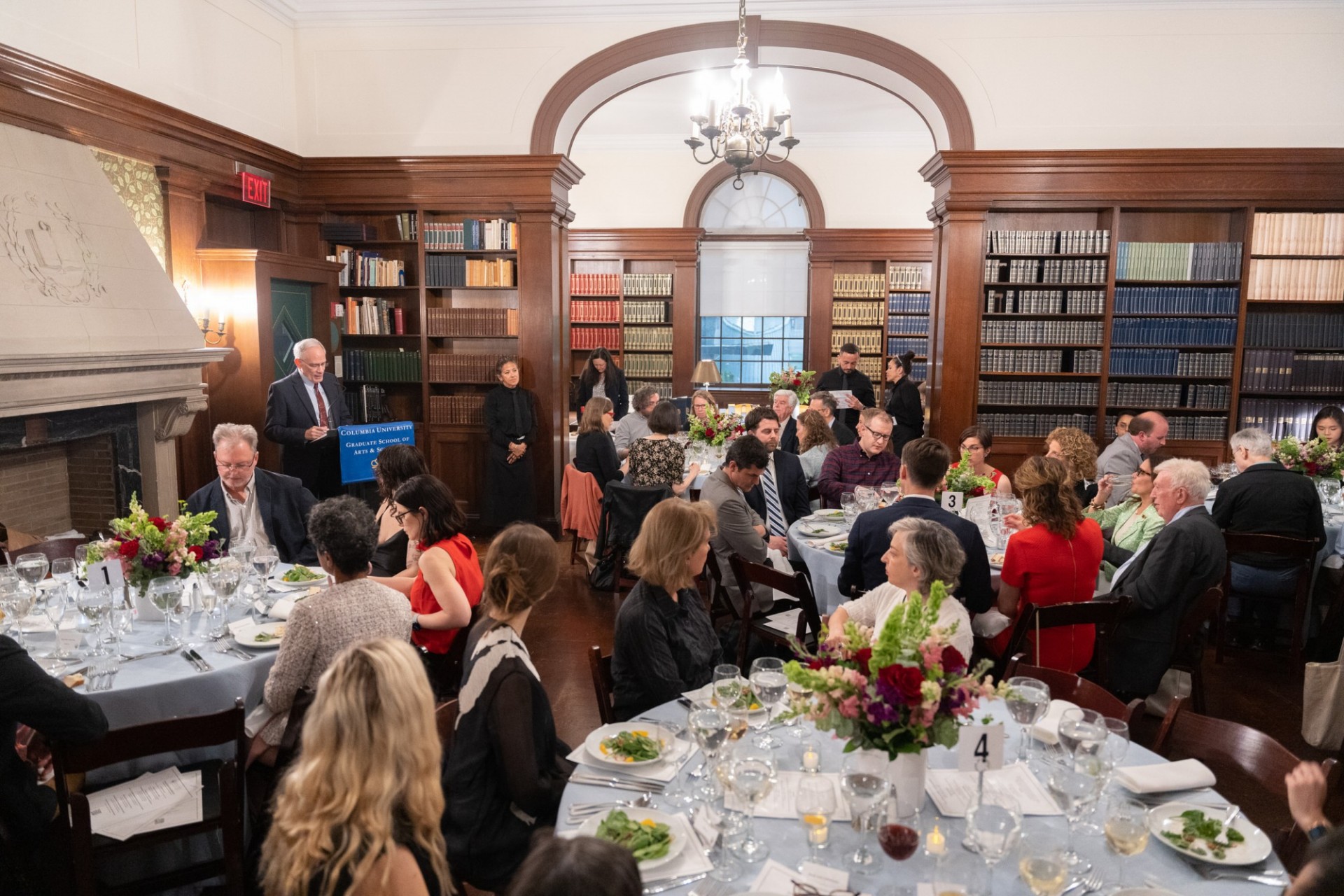
Dean Carlos Alonso giving opening remarks in the library of Casa Italiana
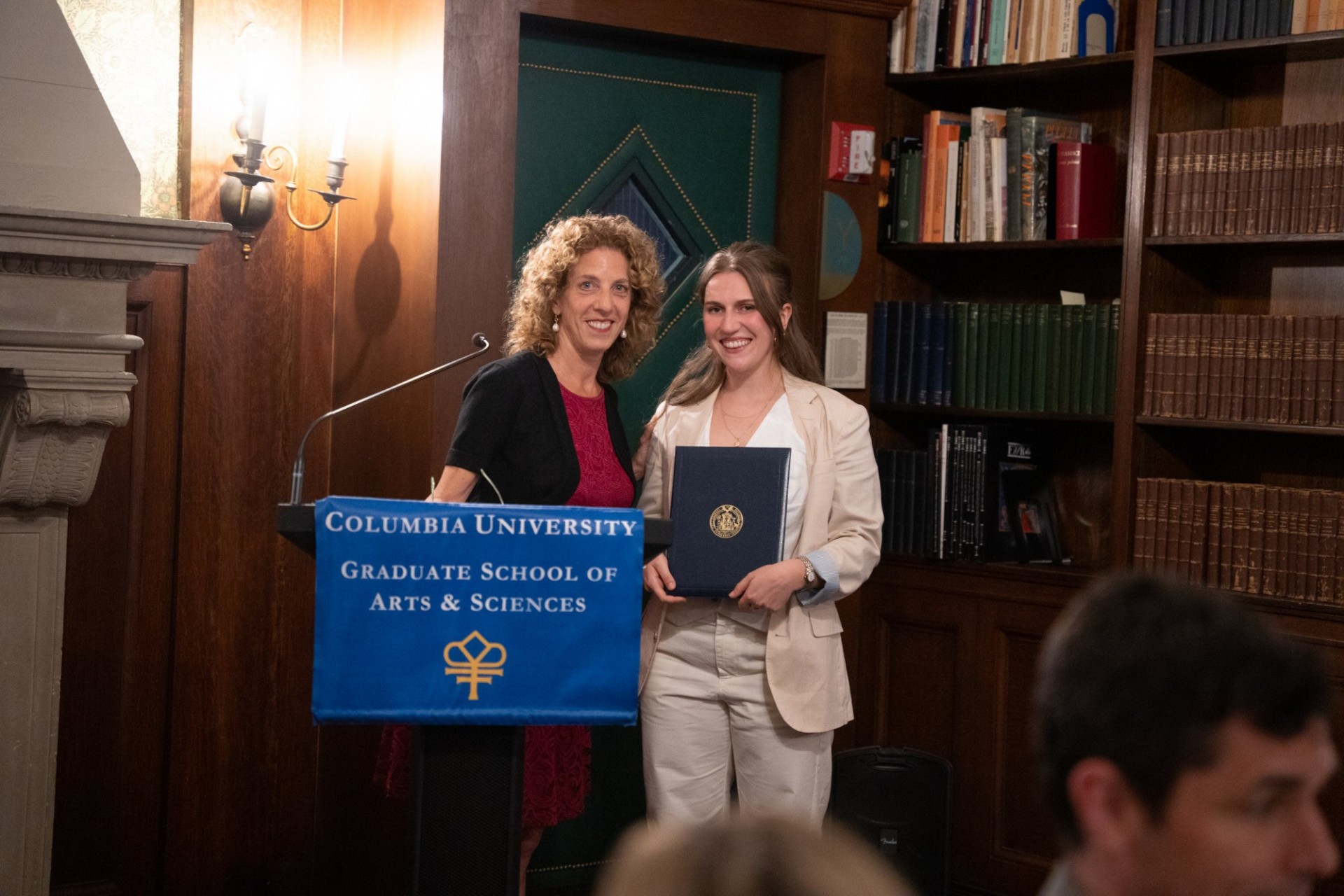
Vice Dean Andrea Solomon with Ana DiGiovanna (’23MPhil, Psychology) recipient of The Presidential Award for Outstanding Teaching by a Graduate Student
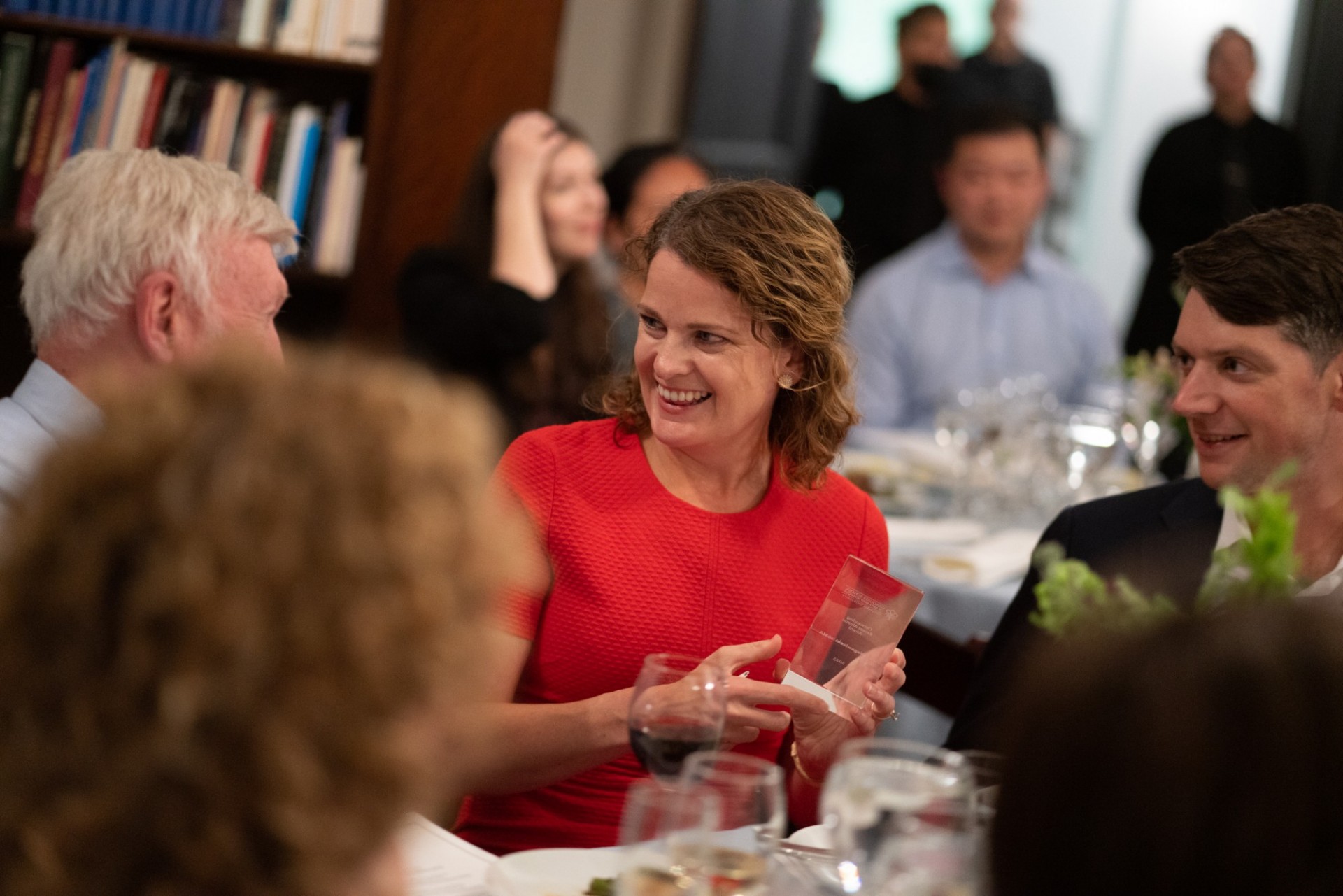
Mia Nagawiecki (’16MA, American Studies), Vice President for Education at the New York Historical Society, recipient of The Outstanding Recent Alumni Award
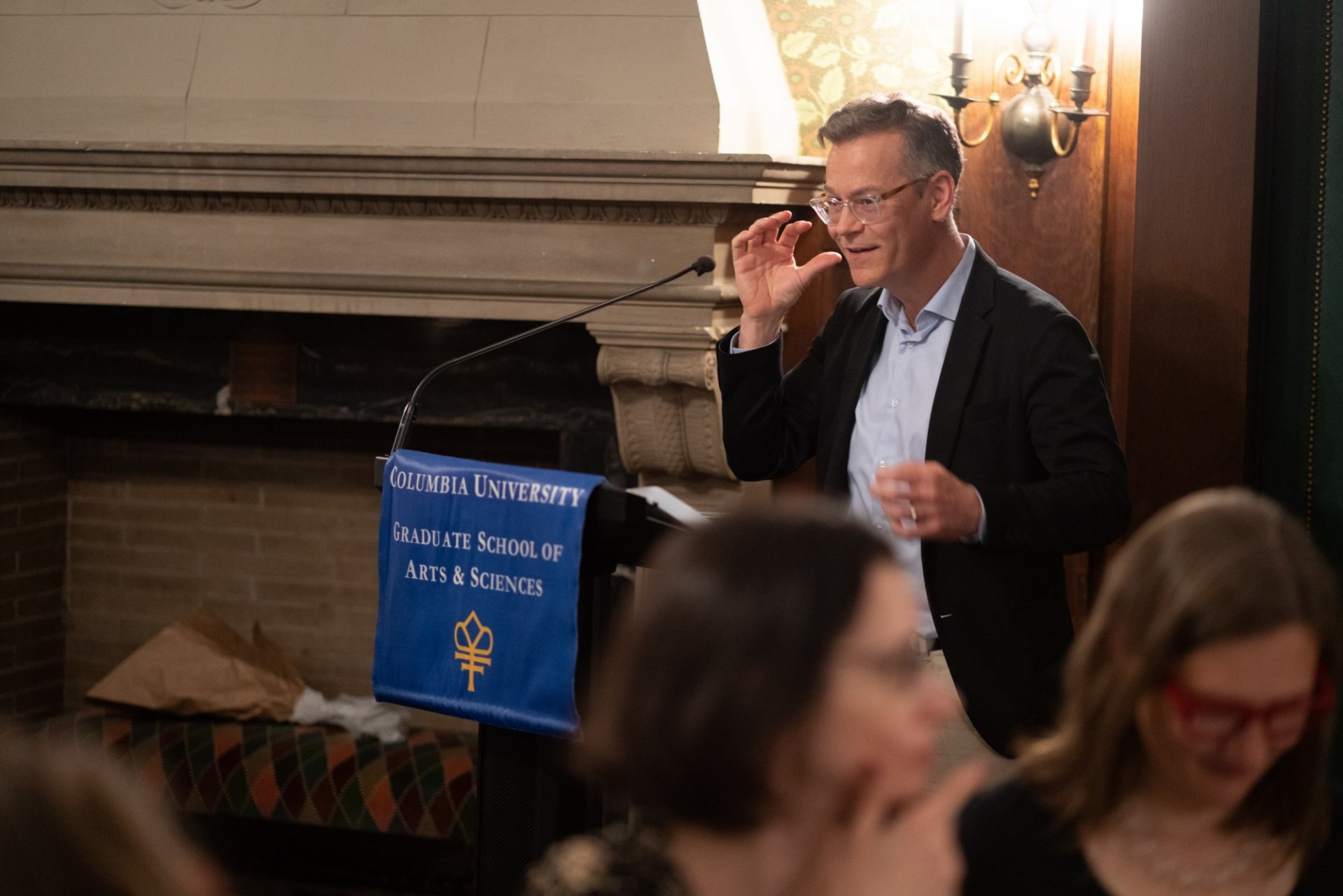
Colin H. Kahl (’00PhD, Political Science) U.S. Under Secretary for Defense for Policy, recipient of The Dean’s Award for Distinguished Achievement

Tyler Campbell (’23MA, African-American Studies) and Della Maggio (’23MA, Human Rights Studies) received The Devon T. Wade Mentorship, Service, and Advocacy Award
On June 6, 2023, Columbia’s Graduate School of Arts & Sciences recognized the achievements of eight alumni, three graduate students, and two faculty members. Fellow alumni, faculty, and friends gathered in the library of Columbia’s Casa Italiana for an evening of celebration. Dean Carlos Alonso, in his opening remarks, noted, “We honor today a select group, each of whom have shared their talents to create our GSAS world-wide community of thinkers, teachers, and researchers, and each of whom, in turn, brings honor to their graduate alma mater.”
The first of the ceremony, The Campbell Award, is given annually to a recent graduate who has shown great leadership traits and community spirit. This year’s recipient was Alejandro Cuadrado (’23PhD, Italian and Comparative Literature), former two-term President of the GSAS Arts and Sciences Graduate Council (ASGC), for which the bulk of his service occurred during the pandemic. Alex also worked as the inaugural Senior Writing Consultant at the GSAS Writing Studio, helping PhD students with their dissertations.
The Faculty Mentoring Award, bestowed by the GSAS students (through the ASGC) went to Naor Ben-Yehoyada (Assistant Professor of Anthropology) and Achille Varzi (John Dewey Professor of Philosophy). Professor Varzi wrote in absentia, “Learning goes both ways, and so does mentoring. This should really be a shared award. And I will share it—with each and every student.”
Recipients of The Presidential Award for Outstanding Teaching by a Graduate Student were Ana DiGiovanni (’23MPhil, Psychology), Chas Firestone East (’22MPhil, Italian), and Connor Martini (’21MPhil, Religion). All three thanked their students; Martini also thanked his cat. Mr. East said the award was a reminder to “treat every student as an individual collection of experiences and skills. Every student brings something new to these ancient texts.”
This year, for The Devon T. Wade Mentorship, Service, and Advocacy Award, the selection committee declared a tie and conferred two awards: first to Tyler Campbell (’23MA, African-American Studies), a mentor and community organizer who worked with the NYC Mayor’s Office on a program in Bedford Stuyvesant, and led a seminar at Rikers Island correctional facility. Campbell dedicated his award to “the people of Bed Stuy, Brooklyn, and some in Pennsylvania.” The other Wade awardee was Della Maggio (’23MA, Human Rights Studies), whose work focuses on gender-affirming healthcare and advocacy for neglected populations. “Devon was a fantastic role model,” said Maggio, “and being a queer person from the South, I feel connected to him.”
Each year, The Outstanding Recent Alumni Award goes to one GSAS Master’s alum and one doctorate alum. This year’s PhD alumna was Adji Bousso Dieng (’20PhD, Statistics) an Assistant Professor of Computer Science at Princeton where she leads a research lab studying artificial intelligence. She is also a research scientist at Goggle AI, and founded The Africa I Know, a nonprofit organization that cultivates interest in STEM and AI among African students and draws attention to contributions Africans have made to the sciences. Ms Dieng could not attend the ceremony. The other award recipient was Mia Nagawiecki (’16MA, American Studies), Vice President for Education at the New York Historical Society, where she developed a curriculum highlighting the contributions of women throughout US history. Ms Nagawiecki reminded listeners that the 250th anniversary of the Declaration of Independence is coming in 2026, and that we should take this moment to remember that “history can tear us apart or bring us together, if told with honesty and with inclusivity.”
The Dean’s Award for Distinguished Achievement for PhD alumni went to Colin H. Kahl (’00PhD, Political Science) currently the U.S. Under Secretary for Defense for Policy, and who has served for years as an advisor in the top levels of government. Kahl spoke about being in New York City during the 9/11 attacks in 2001, and how that drew him into public service. He said his studies at Columbia helped prepare him for the Situation Room at the White House – a place where “it’s very useful to think like an academic, as long as you don’t sound like one.” Receiving the Dean’s Award for Distinguished Achievement among the MA alumni was Lauren Faber O’Connor (’05MA, Climate and Society). O’Connor praised GSAS for pioneering a climate program that created a “suite of environmental classes, focusing on the Interdisciplinary challenge of this crisis.” She encouraged the audience to work together and remain aware of “the interconnectedness of society, policy, and culture” as we work to face climate change.
The final award of the evening was The Dean’s Award for Lifetime Achievement, which went to physicist John Francis Clauser (’70PhD, Physics). He could not attend, but Columbia’s Dean of Science, Robert Mawhinney read a letter from Dr. Clauser, who wrote about retaking Columbia’s Advanced Quantum Mechanics course at least twice, and said, “I possibly owe my Nobel Prize to the confusion about quantum mechanics that originated from that Quantum Mechanics course.” That confusion raised questions that “led me to pursue the experimental work in quantum entanglement, for which I was recognized by the Swedish Academy with the 2022 Nobel Prize in Physics.”
Dean Alonso closed out the evening, reminding all that Columbia is not an isolated, gated-off institution. Instead, “We have always participated in the world through the many accomplishments of our legions of alumni. You, our alumni, have been our emissaries to the world, and all of us at Columbia have rejoiced and will continue to rejoice in your inevitable achievements.”
For a full list of award recipients and bios, click here.
